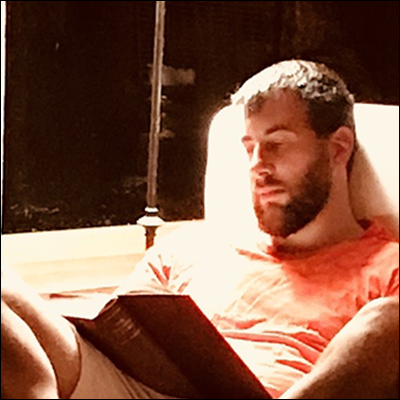More Than Just Messages

On Thursday, March 27, 2013, Ken Mandelkern had an aha moment. It was after supper, and he was on the couch reading A Farewell to Arms as his kids slept upstairs and his wife, Annie, painted in her studio. While deeply engaged in the novel, Ken received an urgent email from IMG, his employer at the time, and, as he tells it: “I immediately turned my attention to writing—and rewriting—a response, trying to channel Hemingway’s stoicism and deictic efficiency and thinking I was being clever and behaving like a good writer.

“I sent that email reply and stopped by Annie’s studio on my way to the kitchen,” Ken continues. “I found her suspended above the wet canvas on the floor. She was painting downward across her hips, reaching with her brush for a spot in the middle and avoiding the swaths of wet paint. And she was completely in the moment. It hit me then that my commercial writing—while it was sometimes creative—was far from an artistic endeavor. I realized that the writing I most admire is, in fact, art in which prose is the medium. And while I had the tools of a competent writer, I was incompetent as an artist.”
By day, Ken is a vice president at Y&R PR in New York City. From his sophomore creative writing class in high school, to his graduation from Syracuse University’s S.I. Newhouse School of Public Communications with a Bachelor of Science in public relations in 2004, Ken has identified as a writer. “I’ve always felt most like myself when I’m reading and writing,” he says. “It’s why I chose a career in communications.”
But Ken couldn’t shake the feeling that he needed to explore a more creative outlet.
“The next morning, I wrote a story while riding the Long Island Rail Road,” he recalls. “It was the first entry in what would become my first writer’s journal. That weekend, I started planning my post-graduate education. I looked into creative writing, literary tracks, philosophy—even art theory and art history. I realized that although I was writing daily, I was not a writer—and the best way to become one was to earn the liberal arts education I had bypassed as a college student for the sake of vocational readiness.”
And so his search began.
Hello, UC Berkeley Extension
Ken’s research on post-baccalaureate education led him to our writing program, even though he lived across the country. He chose to study with us because our certificate program offered the most advantageous mix of benefits, including
- the cachet of an acclaimed university
- an attractive mix of subjects and accomplished instructors
- the practicality and flexibility of an online program
- a formal certificate, dually marketable for an M.F.A. and professional growth
During the next three years (he graduated in May 2017), Ken completed the Post-Baccalaureate Certificate Program in Writing entirely online, one course at a time. And even though he was living in New York, Ken still experienced “the most fulfilling academic experience of my life.”
“I learned how to read—and you can't write without that.”
Why Such High Accolades?
For starters, not all of our instructors live in Berkeley or even the Bay Area, making it possible for Ken to meet with one of his professors outside of class. “My very first instructor, David Rompf, happened to also reside in New York and we met for coffees after our class concluded,” says Ken. “He has been particularly helpful and encouraging. But it wasn’t just him. I was read, critiqued and pushed by an exceptional team of instructors—every single one of whom went beyond their courses’ confines to help me.”
In addition, the online classroom community is a supportive zone, where he and his classmates could share much of themselves with each other, even if they never met in person.
Add to that, there is a wealth of different courses from which to choose, some Ken eventually found fascinating. “My favorite courses were actually the classes I expected to like the least: American Fiction with Joseph Walker, Ph.D., and Shakespeare with Maggie Trapp, Ph.D.,” he says. “I initially approached each as obstacles I had to slog through so that I could get back to the real business of writing. Boy, was I mistaken. Both classes profoundly changed the way I interpret and respond to the world.
“In American Fiction, I stumbled into a smart insight on the Edgar Allen Poe assignment, which Dr. Walker said helped him see the text in a new way. My confidence ballooned, and I started trusting that my observations could, in fact, make good material. I also learned that even our revered literature is flawed and that helped me loosen my approach to my own work. In Shakespeare, I learned you shouldn’t move too quickly or the meaning behind Shakespeare’s words will go right over your head. Studying his work made me appreciate not only the music of good writing but also the shape of it on the page. In that course, I learned how to read—and you can't write without that.”
These things add to the quality curriculum, which ultimately changed Ken’s view of himself as a literary person. “I discovered literature that I would have never opened up to otherwise, and that I had barely scratched the surface of works that I thought I already knew well. I learned how to effectively read and interpret all of it, and how to respond as a writer.
“In learning the fundamentals of craft, I also improved my professional work. I excavated ideas that I didn’t know I had and did the hard work of writing them. And now, I deliberately experience the world as a writer and create from that place within.”
“I used to write messages; now I tell stories. That’s powerful when your business is essentially persuasion.”
A New Perspective
For many in the certificate program, the next step is to apply to graduate programs for writing with the ultimate goal of becoming published.
Ken agrees. “When I started the program, getting published was a goal. But during the program, I matured as a writer and came to see that goal as misguided. For me, the program was like writer’s rehab. I learned that I am compelled to write for other reasons, and that my instinctive desire to be published was the conflation of an entirely different fantasy with the fact that I happen to be pretty good with a pen.
“My writing improved as a result. I am now completely fulfilled, for example, laboring over a story intended solely for my children’s future selves: works of which I am proud, but do not wish to publish in a traditional sense.”
Although graduate school is not in his plans at the moment, Ken is considering it for after his kids are grown. When the time comes, he feels he will still be prepared because of the program.
“The certificate has prepared me for an M.F.A., no doubt,” he says. “I’ve got a portfolio I’m proud of—and the requisite background now—in addition to a working idea of what it would take to do well in the classroom and where I would want to lean in subject-wise. But the writing program really prepared me for much more than an M.F.A.: It’s given me the tools I need to write.
“The certificate has made me measurably better at my work. I write speeches and bylines and other pieces for clients that I could not have written had I not learned to hear the music of people’s speech patterns, and to understand the need for a protagonist, conflict, rising action, climax and vivid sensory detail. I used to write messages; now I tell stories. That’s powerful when your business is essentially persuasion.”


